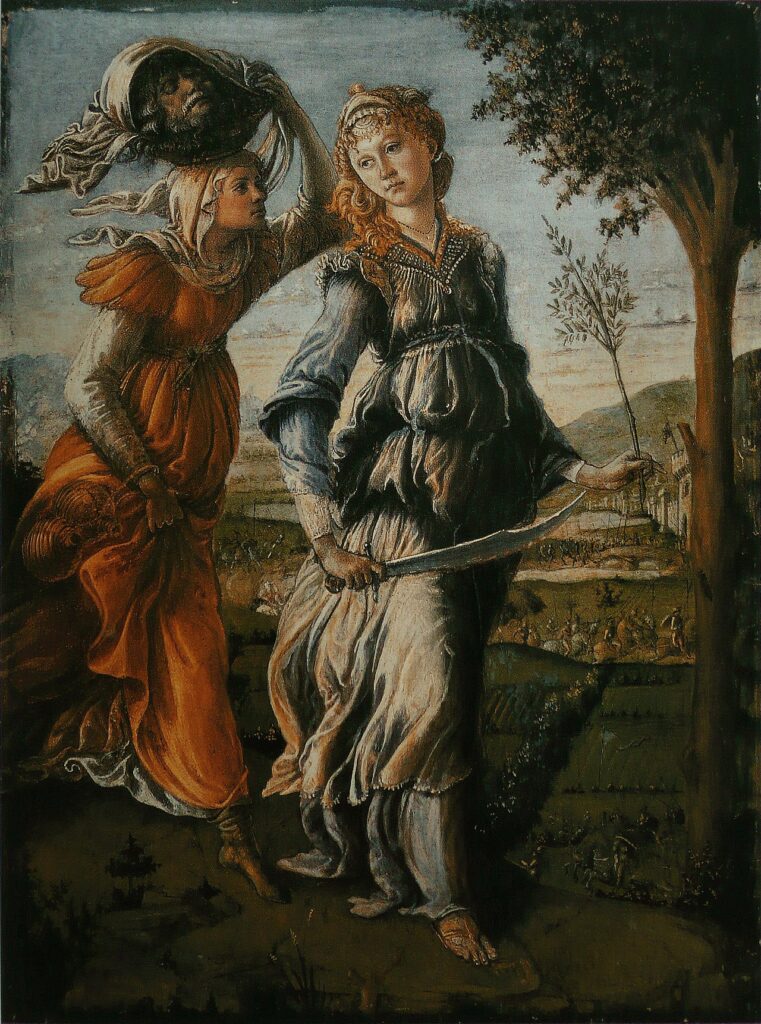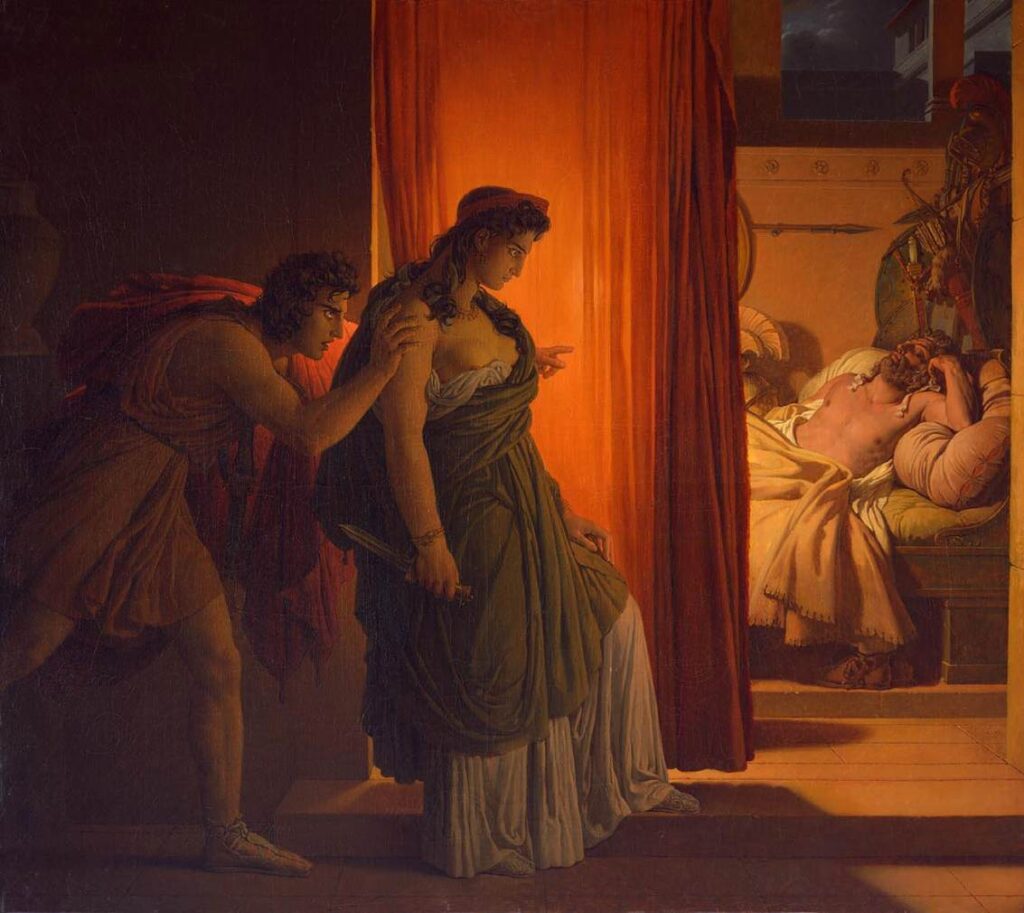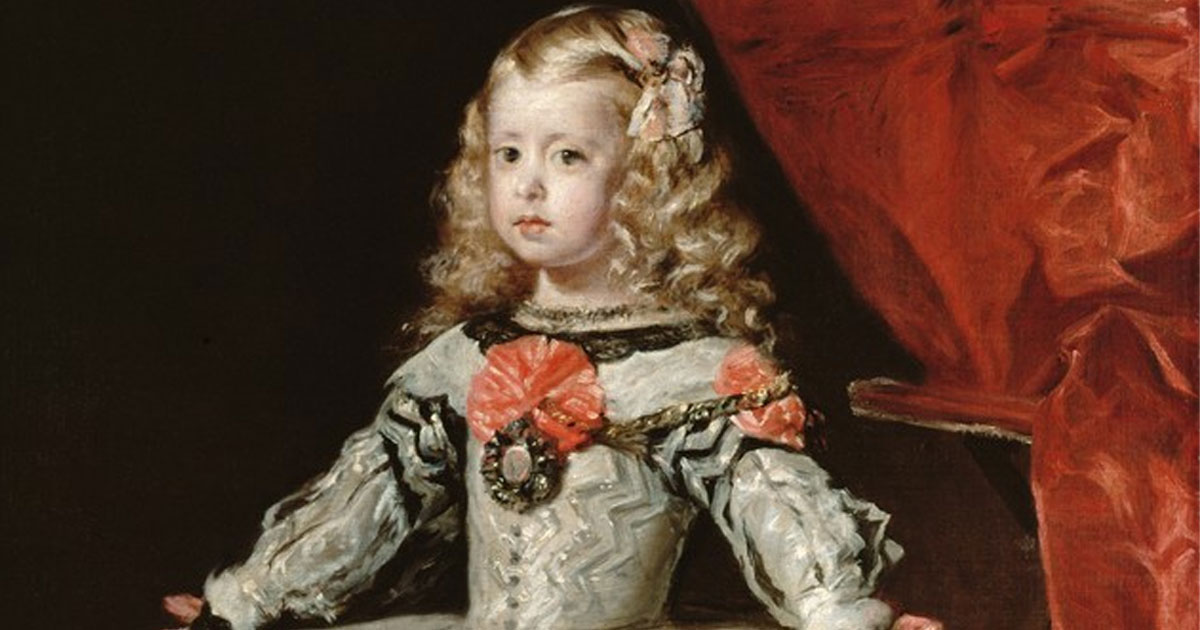The banner painting is that of Margaret Theresa of Spain, born on 12 July 1651 who at the age of 15, by her marriage to Leopold I, became the Holy Roman Empress, German Queen, Archduchess of Austria and Queen of Hungary and Bohemia. She was the daughter of King Philip IV of Spain and the elder full-sister of Charles II, the last of the Spanish Habsburgs. She was referred to as the Infanta – the daughter of a king – a princess. Weakened due to six pregnancies in six years, which included four living childbirths, of which only one daughter survived infancy, and two miscarriages and four months into her seventh pregnancy Margaret died on 12 March 1673, at the age of 21.
Margaret Therese was a true real-life princess, an Infanta, whose childhood innocence was very alluring to her husband, who was also her uncle and 11 years her senior. As a royal princess, she had no self-agency in her destiny and virtually no opportunity to develop it. She was sheltered and pampered, and yet the adult expectation of bearing children was imposed upon her and caused her death. Infanta Margaret Therese never had a chance of growing up.
Some women do have a chance to grow up, yet like Infantas, they cling to their little-entitled-princess status, what Jungian psychologists refer to as puella aeturnus – the eternal child. Growing older is inadvertently an aspect of life no-one can avoid, but some people avoid growing up and others are prevented from growing up.
In the 1950’s, psychologist Eric Berne developed a theory called Transactional Analysis. It is a process which focuses on three major aspects of ego states, namely Child, Parent and Adult. Each state has positive and negative attributes, for instance the positive aspects of the Child state are spontaneity, creativity, etc. and the negative aspects are fear, overly emotional and excessive guilt. Initially a parent and a child find themselves in the Parent > Child transactional mode, as it should be. But once the child becomes a young adult, both the parent and the child should progress to the Adult > Adult mode. It is in this transformation process that most problems arise. Some parents find it very difficult to let go and to acknowledge their children’s right to autonomy. This usually arises out of the parents’ need to be needed – an inferiority-based principle that once the child no longer needs the parent, the parent will become redundant. In order to protect the ego from acknowledging this basic fear of redundancy, the parent tries everything in their power to control the child and keep the child dependent. The child, in their natural maturation process will rebel against the parent trying to keep them in the Child ego state. The more threatened the parent feels, the more they exert their iron fists or psychological blackmailing and manipulation to control the child. The outcome of this process can only be disastrous for both parties and in some cases, it manifests in murder.

In the same way, children who fear growing up, the puella aeturnus, or eternal child who lacks the willingness or skills to face adult responsibilities, may stunt their own natural growth process by attempting to remain within the Child > Parent transactional mode. Through a process of delinquent behaviour, or imaginary illness, or financial troubles, or unemployment, they force and manipulate the parent to perpetually take care of them, by generating guilt feelings in the parent.
In the last stage of Transactional Analysis, when the parent becomes fragile or mentally vulnerable, the adult child acts as Parent to the Childlike parent.
The Greek mythology of Elektra, the daughter of King Agamemnon who plotted with her brother Orestes to kill her mother Clytemnestra, to avenge her father’s death, – as Clytemnestra had killed husband Agamemnon – was revisited in 2001when a young South African couple, then dubbed Adam and Eve due to their minor-status committed the atrocious crime of matricide. Since they are no longer minors their identities have been revealed as Alta Pretorius and Jaco Steijn.

Alta was twelve when her father committed suicide. Although he was an alcoholic, she adored him, manifesting a typical Elektra-complex. She experienced his death as an abandonment. When her father died, she blamed her mother and her life was shattered. Alta consoled herself by smoking dagga. When her mother found out she threatened to put Alta into foster case, like her older sister – this was another potential abandonment threatening her ego. In 1998 the mother and daughter moved to Pretoria and Alta gave up smoking dagga. Yet in January 2000, enrolled in a new school and left to her own devices after school, while her mother was working shifts as a nurse, she began abusing drugs. Not only did she smoke dagga, but she also used heroine, LSD and ecstasy. Alta was a grade 9 pupil at the Hercules Secondary School, where she met and fell in love with Theunis Frederick Jacobus (Jaco) Steijn, a grade 11 pupil.
Jaco had a disruptive childhood. He was the middle of three children and his parents divorced when Jaco was three years old. For two years his mother and the children suffered financially. By the time he met Alta, Jaco had been expelled from three schools for drug abuse and violent behaviour. Another match made in Neorotica and the teenagers decided to run away from home, but they were apprehended by the police and placed in Tutela Juvenile Institution. Here Alta attended a satanic ritual and Jaco observed this incident. During April and May 2001 she was referred to Castle Carey for her drug abuse and Jaco was referred to Magalies Oord for the same reason. Once they were released and back in each other’s arms both of them began using drugs again. Both teenagers moved in with Alta’s mother, Santa Pretorius.
Psychological reports later revealed that Santa was very dependent upon her daughter. She objected to her relationship with Jaco, probably because she resented losing Alta – a typical example of the Parent fearing becoming redundant and trying to keep the Child “in her place”. Alta was 16 years old at this stage and according to recognized psychological developmental phases, this is the age when children emotionally move away from nuclear family dependency towards peer relationships, including romantic relationships to establish their identity. Divorced or widowed parents often make the mistake of transferring their need for emotional happiness on the shoulders of their children. On the other hand, immature puella aeturnus often resent and sabotage their parents forming romantic liaisons with new love interests.
On Saturday 7 July 2001 Alta and Jaco had abused heroin and that evening Santa threatened to evict Jaco from the home, restricting his access to Alta to Friday nights. Things settled down after the heated argument and later that night Santa, Alta and Jaco were sitting on the couch watching television. Alta and Jaco went to the kitchen to have sex, but shortly after they commenced their love making, Santa called Alta. This irritated the teenagers. They joined Santa on the couch and spent the rest of the night watching television until Santa fell asleep on the couch.
At about two o’ clock that morning Alta looked at Jaco and simply said: “Let’s kill her.” She went to the kitchen and fetched knives and when Alta woke up due to the brutal attack and pleaded for her life, Alta joined her boyfriend in stabbing her mother to death. Santa was stabbed more than 20 times. Jaco then strangled her with a shoestring, just to make sure. The couple smoked dagga (cannabis) and decided to go for a walk. They returned to the flat where they had sex, before they went to bed.
The following morning they were faced with a dilemma many impulsive murderers do not reckon with – what to do with the body. Their solution was to dismember the body and flush the parts down the toilet. Clearly the orbito-frontal pre-cortex of these two teenagers were not developed to consider long term consequences of their actions. Many a plumber can testify to the occupational hazard of finding a drain clogged up with decomposing body parts. Stereotypically, the teenagers were too lazy to dismember the body.
Their next solution was equally immature and macabre. They chose to ignore the problem, hoping it would resolve itself, and decided to live and eat in one of the bedrooms as the putrid stench of the decomposing body disturbed them. Natasha, Santa’s older sister had called in the meantime and Alta told her their mother had left with a man in a red golf and she had not yet returned. Jaco and Alta feared that her uncle would arrive at the home, so they covered Santa’s body with a duvet and dragged it behind the couch so that it could not be spotted from the window. They covered the blood on the floor with a blanket. When the uncle arrived, they did not open the door and he left.
In the meantime, Natasha, having had no response from her mother, requested the police and fire brigade by Tuesday morning 11 July to investigate. They discovered the badly mutilated and decomposing body of Santa Pretorius hidden behind the couch. Besides the blood, leftover food was messed all over the beds and floors and dirty dishes were stacked in the kitchen. It was clear that someone had been living with the body in the same home for a few days. Then they found a letter.
“10 July 2001: 10:59
Right now, we, (me & Jaco) are waiting for my uncle to arrive here at the flats where my mom’s body is lying. We just moved her so nobody can see her when they are looking through the window.
Adam: Present: My heart is beating like a drum at all the excitement that’s happening around us. My girlfriend’s uncle is on the way to the flats of Ontorio. Where moments ago (me & Alta) moved the furniture to hide her old lady so that if her uncle arrives heal only see furniture and me & Eve will be in one room full of sadness and paranoia.
“You see we are not bad people, we really do love each other. I’m not going to give in. I’ll stand by my man. This Adrenillin rush is not good for my heart. I know my Baby s also scarred, he just sits there full of stress and mixed emotions. I really didn’t want anything bad is this happening, I’m also in my fuckyou in if they catch us today. Ill go on loving my true love and also waiting for him. God I think my uncle is here, please help us.”
Alta and Jaco returned, saw the police activity at the house and attempted to hi-jack a car with a stolen firearm, but they were apprehended and arrested. Alta and Jaco were interrogated by Captain Riette Everton, national section chief of the Occult Related Crimes Unit. Both of them willingly and separately made full confessions. Both said that they were not seriously involved in satanism at all save for a few encounters, but that they were both drug addicts.
Alta and Jaco were charged with murder, theft, robbery with aggravating circumstances and being in possession of an unlicensed firearm and ammunition. The case presided before acting Mrs Justice Lizette Meyer. They pleaded guilty to all charges. Both children were sent for psychiatric evaluation. At that stage since they were both minors, they were referred to as Adam and Eve. During their initial court appearances Alta and Jaco professed their love for each other and wrote each other bags full of love letters. Not one of their family members was prepared to post bail for them so they were kept in custody throughout the trial.
Psychologists found that Alta had narcissistic traits, she was manipulative and impulsive. Her deep emotional insecurity manifested as aggression. She ignored the mother figure and experienced abandonment by her mother. She experienced her mother as insensitive to her needs. Unsatisfied needs of an infantile nature were present.
In Jaco’s case it was obvious that his behavioural problems put a strain on his relationship with his mother. His father was absent during Jaco’s childhood years, yet Jaco had developed a hero worship for him. He got along with his stepfather, but this man could not discipline him.
Dr Irma Labuschagne, well-known criminologist, testified that Alta received no love from her mother. She would be burned with a pan if she refused to eat. Alta grew tired of her mother’s incessant demands and of doing her work. “Since I was a little girl, my mother threatened to give me away, like she gave away my other sisters. I dreaded this every day,” Alta had told Dr Labuschagne. Jaco had told her how he and his sister were neglected after school because their mother worked shifts to earn an income. He said after his father had left the family to live with another woman, no-one discussed the situation with the children. Of Jaco, Dr Labuschagne said he was a textbook example of someone exhibiting antisocial behaviour. Both Dr Labuschagne and Mrs Justice Meyer were of the opinion that the system had failed Jaco earlier in his life.
By the time Mrs Justice Meyer was ready to sentence the pair, “Eve” was no longer in love with her “Adam”. Alta ignored Jaco in court and refused to speak to him. He still professed his love for her. Mrs Justice Meyer sentenced them both to 21 years imprisonment. She stated that Alta had to complete at least 15 years of her sentence and be rehabilitated before she could be considered for parole. She said it was clear from the diaries Alta had kept, that in their last months before the murder they lived a life in which unrestrained sex, drugs and alcohol featured prominently. They had shown no respect for any form of authority.
In late 2024, 36-year-old Virginia McCullough, of Essex, England was sentenced to 36 years imprisonment for killing both her parents and astonishingly, she lived with their bodies entombed in their home for four years.
In June 2019 Virginia poisoned her father, John McCullough, aged 70, with prescription medication that she crushed and put into his alcoholic drinks and the following day she beat her mother, Lois McCullough, aged 71,with a hammer and stabbed her multiple times in the chest with a kitchen knife. She entombed her father in a rectangular tomb in his study, built with bricks and covered it with blankets and paintings and she wrapped her mother’s body in a sleeping bag and stuffed it into a wardrobe in her mother’s bedroom on the top floor of the house.
Alerted by physicians that the elderly couple were missing their appointments, police finally forcefully entered the home in September 2023 and discovered the bodies. Apparently Virginia did not offer any resistance to the arrest, immediately confessed and is alleged to have added: “Cheer up, at least you caught the bad guy.” She also pointed out the rusted blood covered knife, hidden in the stairwell.
Since she was unemployed and had a gambling addiction, Virginia – an adult woman – was living off her parents – behaving like a spoilt Infanta. She stole the pensions of her deceased parents. She was a woman refusing to transcend the Child mode to the Adult mode and manipulated her indulging parents to remain in the Parent role. The judge, Mr Justice Johnson, said Virginia’s actions were a “gross violation of the trust that should exist between parents and their children.”
Virginia McCullough killed for money and this principle will be explored in my article on the origin of female serial killers.
Top image: Infanta Margarita in a White and Silver Dress by Diego Velázquez (1656) (Public Domain)
